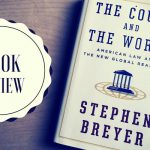In an earlier post, I may not have convinced you totally that international law is vital aspect of international relations, but I am going to assume that I have anyway. Because it is time to move on to a deceptively simple question. Why do states follow the rules and principles of international law most of the time? This is both a practical and theoretical question, which is why I was probably drawn to it in the first place. And as it turns out, there is a whole subgenre in international legal theory about this very question, and I got myself involved. Although I will not be doing this kind of research within the confines of a university, I do intend to continue outside of it. Because it is fascinating. Really Just bear with me.
‘Why not’?
Funny thing though. The question that I am asking in the research is not exactly ‘why’, but rather ’why not’ More specifically, why isn’t the United States complying with a certain provision of the Vienna Convention on Consular Relations, or with a binding order of the International Court of Justice telling the US to ensure compliance? To answer this question, I looked at theories of compliance. Both international relations scholars and legal scholars participate in compliance theory. Compliance theory is an under appreciated field, and sometimes not even considered a part of legal theory. Perhaps because it is empirically-driven, meaning that the only way to theorize about compliance is by examining real-life cases; what exactly happened? Compliance theory is sometimes looked down on as legal theory ’light’, but to me it seems to the closest thing to ’real’ science. But just so you understand, I am not disparaging my more theoretical colleagues. I am just interested in more practical problems. Paradoxically, it doesn’t ’feel’ like academic research. Just common sense.
Compliance theory: TLP
Because my thing is about domestic implementation of international law, I focus on one theory in particular. Transnational Legal Process (TLP) was first coherently formulated by Professor Harold Koh from Yale and former Legal Adviser of the US State Department (for an outline, read Koh’s foundational article here). It is an attractive theory that tries to explain how international law becomes part of domestic law, culture, and even a country’s values. As I mentioned in my previous post, what is it in American law, culture or value system that keeps it from complying with these specific rules of law? TLP may provide clues as to where to start the research, to make the necessary connections. Sure, TLP has its flaws, but it is a good place to start. In the process I may be able to say something coherent about the theory itself. But for now, the goal of using the theory is to identify those factors that impede the implementation of the US’ international obligations.
In future posts, I will tell you more about how the US legal system has dealt with its consular relations obligations.
Have you had any experience with consular assistance when traveling abroad? Let me know in the comments below, through Facebook or Twitter.




[…] quick reminder: I have mentioned here a few times that I have gotten into compliance theory a few years ago, i.e. the question of why […]